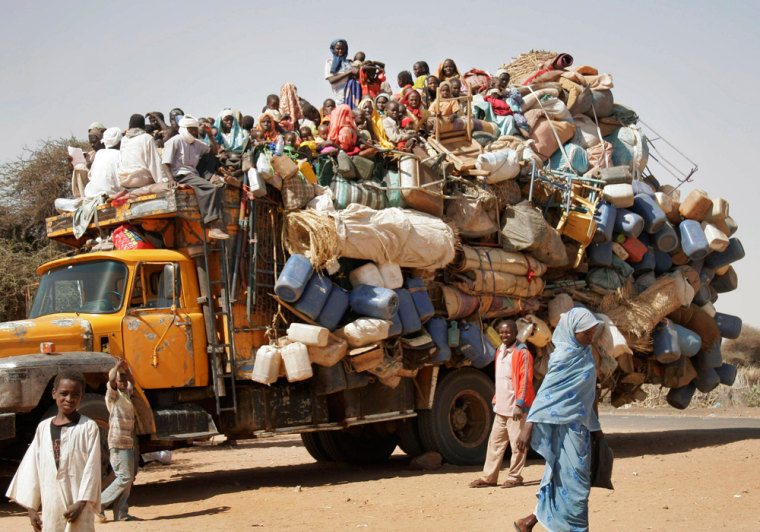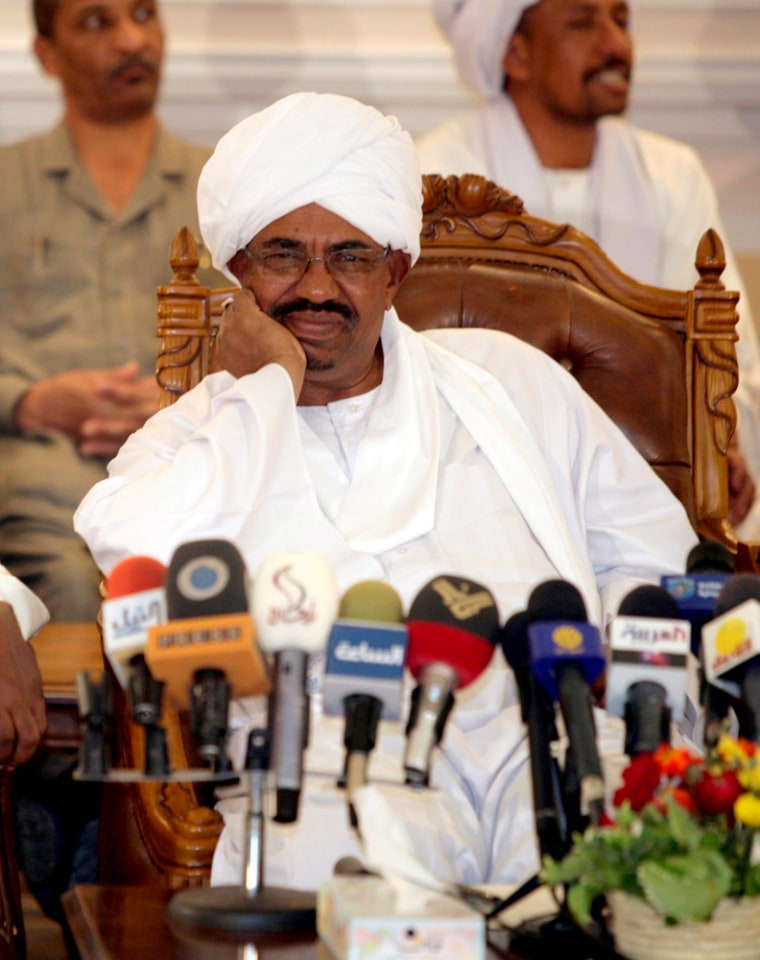Iran and the Palestinian militant group Hamas showed their support for Sudan's president Friday, sending top officials to the Sudanese capital and denouncing the international warrant for his arrest on charges of war crimes in Darfur.
Their visit came as the U.N. human rights group warned that Sudan's expulsion of 13 aid organizations from Darfur could also constitute a war crime. Sudan took the step in retaliation after the Netherlands-based International Criminal Court issued a warrant against President Omar al-Bashir on Wednesday.
The expulsion raised fears of a humanitarian crisis in the large, arid western region, where war has been raging for six years. Some 2.7 million people have been forced from their homes, and many rely on aid groups for food, water, shelter and medical care.
The government also ordered the closure of SUDO, the largest Sudanese non-governmental aid organization operating in Darfur, said SUDO's head, Ibrahim Mudawi. He said the order came late Thursday, accusing the group of "violations" of the law, without providing specifics.
SUDO, with about 300 staffers, distributes food and drills water wells in Darfur, as well as operates 13 clinic and provides psychological help, Mudawi said. "We will take legal procedures against this decision," he said. "We are worried (about our staff). We don't know what they are going to do with them."
The ICC accuses al-Bashir of leading a counter-insurgency campaign against Darfur rebels that included atrocities against civilians. Al-Bashir denies the charges against him and his government refuses to cooperate with the ICC, calling it part of a "colonial" conspiracy to destabilize Sudan.
Dozens of al-Bashir supporters marched in downtown Khartoum after Friday prayers in support of the president. They are waving banners and shouting: "With our blood and soul, we defend you, al-Bashir." The small rally came after al-Bashir joined thousands of supporters demonstrating in the capital on Thursday, denouncing the warrant.
Iran, Hamas envoys arrive together
Iran's parliament speaker, Ali Larijani, arrived in Khartoum along with Moussa Abu Marzouk, the No. 2 figure in Hamas' Damascus-based leadership. Larijani told reporters at the airport that the ICC's arrest warrant is an "insult." Also in their delegation were Syrian Parliament Speaker Mahmoud al-Abrash and representatives from other Palestinian militant factions.
Iran and Hamas have been long time allies of Sudan's President Omar al-Bashir, whose government is dominated by Muslim fundamentalists and military officers.
A spokesman for the U.N. human rights office said Friday that the expulsion of the groups may be a war crime and said officials at the agency were looking into the issue.
"To knowingly and deliberately deprive such a huge group of civilians of means to survive is a deplorable act," Rupert Colville said in Geneva. "Humanitarian assistance has nothing to do with the ICC proceedings. To punish civilians because of a decision by the ICC is a grievous dereliction of the government's duty to protect its own people."
"This decision by the government could threaten the lives of thousands of civilians," living in camps in Darfur and elsewhere, he added.
Asked about the comments, a senior Sudanese Foreign Ministry official, Mutrif Siddique, said only, "Their campaign against us continues."
Siddique said the Sudanese humanitarian affairs ministry, which is responsible for the work of aid agencies, is aware the expulsion of the organizations will have an impact on people in Sudan.
"This ministry and authorities have made arrangements to avoid a food shortage or a medical crisis," he said. "There will be a partial effect and they (authorities) will work to avoid any shortage.'
Siddique claimed that major U.N. aid agencies were not affected by this expulsion decision and stressed that "hundreds of Sudanese NGO workers remain and work in Darfur."
The U.S. State Department condemned the decision to expel the aid groups and called on the Sudanese government to allow the groups to continue operating.
"These organizations provide critical humanitarian assistance to millions of Sudanese, and the forced departure of these organizations immediately and seriously threatens the lives and well-being of displaced populations," said spokesman Gordon Duguid.
'Don't have the capacity'
The World Food Program questioned whether the remaining aid groups would be able to fill the gap.

"We simply don't have the capacity to carry out the life saving work of the NGOs," said the agency's spokeswoman in Geneva, Emilia Casella.
Under the Geneva Conventions it is illegal to intentionally starve people to death by blocking their access to food. The rule applies to international conflicts, but efforts have been made to incorporate it in customary international humanitarian law, which would carry weight in courts.
Other U.N. agencies also expressed concern about the consequences of losing their aid partners. The World Health Organization said it would tear a hole in the body's disease monitoring efforts that could lead to outbreaks of infectious diseases going unchecked.
"If they are not helping us do this very vital work, we may see the emergence of infectious diseases," said WHO spokeswoman Fadela Chaib.
More on International Criminal Court | Darfur
